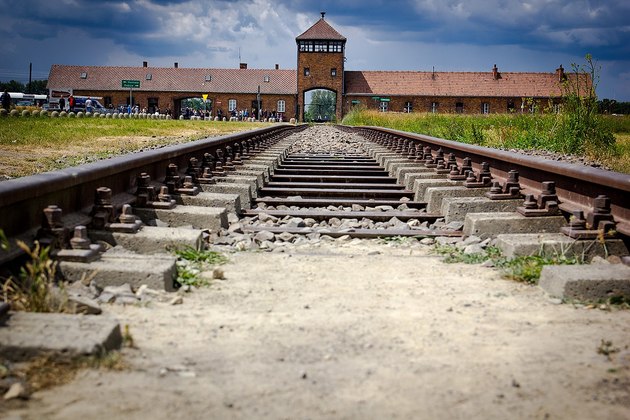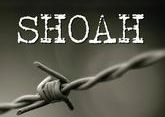On January 24, the exhibition 'Unconquered', dedicated to the International Holocaust Remembrance Day, will be opened at the Victory Museum at Poklonnaya Hill. The curator of the exhibition, head of the Victory Museum's exhibition department Nina Zabarovskaya said that the exhibition will depict the origins of the Nazi racial theory, developed and thought out in the concentration camp system. Visitors will learn about Auschwitz, Dachau, Mauthausen, Jasenovac, Sobibor concentration camps....
The exhibit features personal items, documents of prisoners of concentration camps, as well as objects found at the massacre sites. There will be more than a hundred paintings and graphic works about captivity and the Holocaust. The posters, photographic materials will revive the memory of innocent people who died. Among them are works created by people who went through the hell of the concentration camps. These are sculptor Konstantin Borisov and artist Sergey Rozanov.
"Artist Sergei Rozanov, a Great Patriotic War veteran, went through the hell of the concentration camps himself, was a participant in the Mauthausen uprising. The exhibition will feature a series of his works on this topic," Zabarovskaya said. "One can’t ignore Gennady Dobrov’s works either. He made them after visiting the former fascist concentration camps in Poland, the Czech Republic, Germany ... Special emphasis will be placed on the fate of Mikhail Devyatayev, Alexander Pechorsky and Dmitry Karbyshev, The exhibition will present personal items, documents, diaries, memoirs and photographs documenting uprisings in the camps. The exhibition was organised with the participation of the Alexander Pechersky Foundation, but this year the project became international. Several foreign museums have taken part in this project. The exhibition runs until March 4, 2020."
Head of the Victory Museum's International Relations Department Anastasia Kretova added that the topic of Auschwitz and the Holocaust is international: "The Victory Museum has organized block 14 of the Auschwitz-Birkenau state museum. We have a permanent exhibition, created with the participation of many museums, including the Holocaust center. The exposition has been constantly open since 2013. We participate in international conferences, we also represent the Fund’s collection, Auschwitz-Birkenau. On January 27, we will participate in the memorial events in Auschwitz. There will be representatives of the Russian Jewish Congress, the Holocaust Foundation, the general public. Recently, the Victory Museum's exhibition has opened at the UN headquarters... We must discuss, remember those events and pass it on to the next generations. One of the museum’s tasks is revealing real events that happened during World War II."
Head of the Holocaust center archives Leonid Terushkin advocated the development of international exhibition projects: "Four years ago, the Russian Holocaust center, using the materials of the Victory Museum and another 20-30 Russian and foreign, state and public organizations, even private collections, prepared the exhibition 'Holocaust: destruction, liberation and salvation'. This exhibition has traveled to North and South America, France, Germany, Israel, the UK, Czech Republic, and Slovakia.
Russia has a large number of unique documents about those who were saved during the Second World War, during the Holocaust, about those who died, about those who freed and saved people. This topic, unfortunately, often undeservedly forgotten, still requires educational work ...
The Russian Center 'Holocaust' has prepared a new version of the exposition 'Holocaust: destruction, liberation and salvation' for educational institutions. We are preparing an exposition in Polish with an emphasis on the fate of the Polish prisoners of Auschwitz, not only the Jews who died there....
Last summer, the liberation of the Majdanek camp by the Red Army was marked. The 'Holocaust' Center and the Russian Military Historical Society have prepared a collection about Majdanek and its prisoners, Jews, Poles, Russians, Soviet war prisoners ... But there's so much we don't know about the Holocaust, unexplored events, unknown names. Unfortunately, we remember more about criminals, about Holocaust performers, than about its victims or about those who saved people: doctors, soldiers and officers of the Red Army."
Director of the Russian Military-Historical Society, professor at the Moscow State University of Foreign Affairs Mikhail Myagkov said that about 18 million people, primarily civilians, were contained in Nazi concentration camps and death camps during the Second World War. Of these, more than 11 million were killed, tortured, shot and executed using gas chambers. One of the worst death camps during the Second World War was the Auschwitz-Birkenau concentration camp, also known as the Auschwitz concentration camp. According to various sources, from 1.3 to more than 3 million people were contained there. Even the camp commandant, when questioned, could not give a more accurate figure. He did not count them. People were brought there from different countries. The vast majority of the killed in this camp are Jews brought from the occupied territories of the USSR, Europe, Poland, Hungary, Holland and many other countries."
"On January 27, 1945, the camp was liberated, and the UN declared this day as International Holocaust Remembrance Day. On January 27, 1944, Leningrad was freed from the enemy blockade. "The severe blockade of Leningrad and what happened in Auschwitz-Birkenau are symbols of the Nazi regime, symbols of the killing of peaceful people, symbols of the fact that we must always remember these victims and seek the absolute truth about what happened during the Second World War, never allow a review of the Nuremberg Tribunal's decisions, which condemned the main Nazis offenders, and subsequent trials of Nazi criminals of a lower rank," Mikhail Myagkov said.








